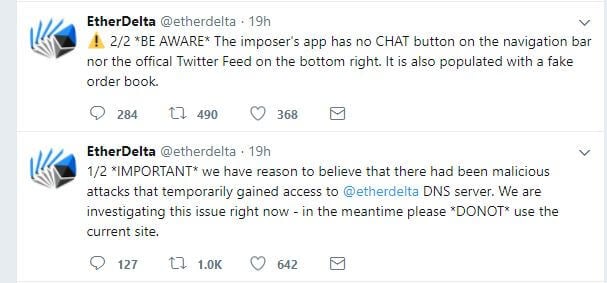Cryptocurrency Exchange EtherDelta Hacked in DNS Hijacking Scheme

The DNS server of decentralized cryptocurrency exchange EtherDelta was successfully breached by an attacker on Wednesday, enabling the hacker to redirect users to a malicious website.
EtherDelta DNS Servers Hacked
EtherDelta made the announcement in a series of tweets, warning users that a hacker had temporarily hijacked its DNS server, enabling the attacker to send users to a fake, malicious version of the site.

As a decentralized exchange, EtherDelta is governed by smart contracts, meaning that the exchange does not have third-party control of user funds. However, the service does allow users to directly import their private keys to the exchange itself.
Consequently, the hacker was able to steal funds from users who unknowingly imported their private keys into the impostor website.
According to data obtained from the Ethereum blockchain , it appears that the hacker stole approximately 308 ether — worth approximately $250,000 at the present exchange rate — as well as a number of ERC20 tokens.

EtherDelta said that users who accessed the exchange using either MetaMask or a hardware wallet are “completely safe” from the phishing attack. The company added that deposits from users who never imported their key on the fake version of the website “should be safe,” but traders may want to consider moving their funds to a new wallet address as a security measure — and reevaluate their decision to import their private keys directly into a website.
The Dangers of Cryptocurrency Exchanges
The attack came just days after South Korean exchange Youbit revealed that it lost 17 percent of its assets as the result of a hack — the second the company had endured this year — forcing its operator, Yaipan, to declare bankruptcy.
Like Youbit, EtherDelta was a small exchange. CoinMarketCap reports that it processed roughly $7 million of volume during the past 24 hours, a figure that is somewhat lower-than-average due to the breach. However, the exchange was popular among ERC20 token traders, as it was often one of the first exchanges to support tokens derived from lower-profile initial coin offerings (ICOs).
Neither of these hacks will lead to a significant disruption in the global cryptocurrency markets, but each demonstrates the risks associated with using cryptocurrency exchanges, centralized or not.
Featured image from Shutterstock.